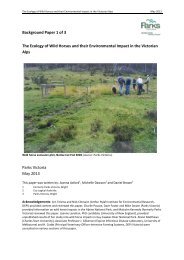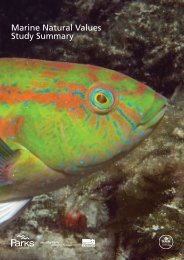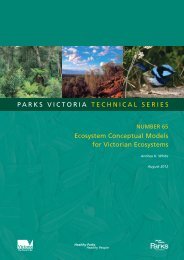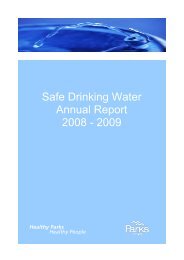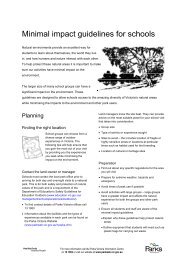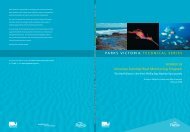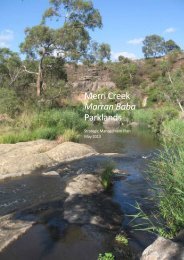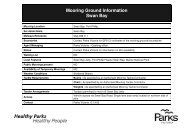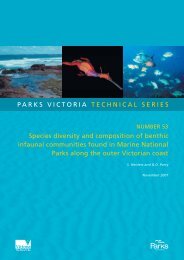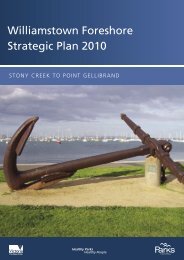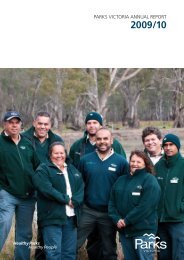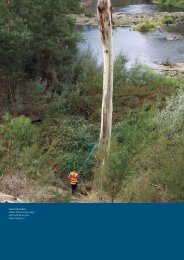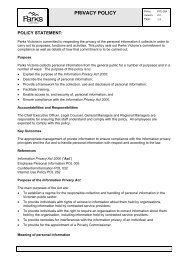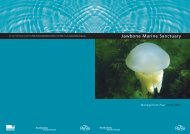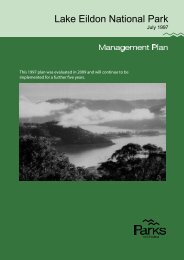Consent Form - Parks Victoria
Consent Form - Parks Victoria
Consent Form - Parks Victoria
Create successful ePaper yourself
Turn your PDF publications into a flip-book with our unique Google optimized e-Paper software.
STAFF-IN-CONFIDENCE (WHEN COMPLETED)NATIONAL POLICE CHECKING SERVICE(NPCS)APPLICATION/CONSENT FORM(ACCREDITED AGENCIES - CUSTOMERS)GENERAL INFORMATIONGENERAL INFORMATIONThis <strong>Form</strong> is used as part of the assessment process to determine whether a person issuitable for employment or other engagement for work or other entitlement.Unless statutory obligations require otherwise, the information provided on this <strong>Form</strong> willnot be used without your prior consent for any purpose other than in relation to theassessment of your suitability. You may be required to complete another consent form inthe future in relation to employment in other positions.NATIONAL POLICE HISTORY CHECKA national police history check is an integral part of the assessment of your suitability.You should note that the existence of a record does not mean that you will be assessedautomatically as being unsuitable. Each case will be assessed on its merit, so it is in yourinterest to provide full and frank details in the form.Information extracted from this <strong>Form</strong> will be forwarded to the CrimTrac Agency and otherAustralian police agencies for checking action. By signing this <strong>Form</strong> you are consenting tothese agencies accessing their records to obtain and disclose police history informationthat relates to you to: (i) the accredited agency named in Section 3 above; and (ii) whereapplicable the employer/organisation named in Section 4 above.Police history information may include outstanding charges, and criminalconvictions/findings of guilt recorded against you that may be disclosed according to thelaws of the relevant jurisdiction and, in the absence of any laws governing the release ofthat information, according to the relevant jurisdiction's information release policy.It is usual practice for an applicant’s personal information to be disclosed to Australianpolice agencies for them to use for their respective law enforcement purposes includingthe investigation of any outstanding criminal offences.SPENT CONVICTIONS SCHEMESThe aim of spent convictions legislation is to prevent discrimination on the basis of certainprevious convictions. Spent convictions legislation limits the use and disclosure of older,less serious convictions and findings of guilt.Spent convictions of specific offences will be released where the check is required forcertain purposes regardless of how old they are.Each Australian police agency will apply the relevant Spent Convictionslegislation/information release policy prior to disclosure.If further information or clarification is required please contact the individual police agenciesdirectly for further information about their release policies and any legislation that affectsthem.Western AustraliaUnder the provisions of Section 7(1) of the Spent Convictions Act 1988 (WA) only “lesserconvictions” can be spent by Western Australia Police, after a time period of 10 years plusany term of imprisonment that may have been imposed. A lesser conviction is one forwhich imprisonment of 12 months or less, or a fine of less than $15,000 was imposed.All other convictions, such as “serious convictions” applicable under Section 6 of the Actcan only be spent by applying to the District Court. At the time of sentencing, the Court maymake a “spent conviction order” under the Sentencing Act 1995 (WA) that the conviction isa spent conviction for the purposes of the Spent Convictions Act 1988 (WA).South AustraliaRelease of information on a National Police Check is governed by the South AustralianSpent Convictions Act 2009. It is an offence to release information regarding theconvictions of a person if those convictions are deemed to be ‘spent’ under the Act.A spent conviction is one that cannot be disclosed or taken into consideration for anypurpose. Eligible convictions become spent following a 10 year conviction and provenoffence-free period for adults, and a 5 year conviction and proven offence-free period forjuveniles.The Act defines a conviction as:i). a formal finding of guilt by a Court;ii). a finding by a Court that an offence has been proved.Certain convictions can never be spent. These include but are not limited to:i). convictions of sex offences;ii). convictions where a sentence is imposed of more than 12 months imprisonment for anadult, or 24 months imprisonment for a juvenile.Schedule 1 of the Act sets out a number of exceptions to the rule where spent convictionscan be released. Some examples of this include:i). the care of children;ii). the care of vulnerable people (including the aged and persons with a disability, illness orimpairment);iii). activities associated with statutory character tests for licensingInterstate offences are released in accordance with that State or Territory's spentconviction / rehabilitation legislation and policy. Intelligence-type information is not released.1 Australian Federal Police, The New South Wales Police Force, <strong>Victoria</strong> Police, QueenslandPolice Service, South Australia Police, Western Australia Police, Tasmania Police Service,Northern Territory Police Force.2 Applicable spent conviction legislation, as amended from time to time.CommonwealthPart VIIC of the Crimes Act 1914 (Cth) deals with aspects of the collection, use anddisclosure of old conviction information. The main element of this law is a “Spent ConvictionsScheme”. The aim of the Scheme is to prevent discrimination on the basis of certain previousconvictions, once a waiting period (usually 10 years) has passed and provided the individualhas not re-offended during this period. The Scheme also covers situations where anindividual has had a conviction “quashed” or has been “pardoned”.A “spent conviction” is a conviction of a Commonwealth, Territory, State or foreign offencethat satisfies all of the following conditions:i). it is 10 years since the date of the conviction (or 5 years for juvenile offenders); ANDii). the individual was not sentenced to imprisonment or was not sentenced to imprisonmentfor more than 30 months; ANDiii). the individual has not re-offended during the 10 years (5 years for juvenile offenders)waiting period; ANDiv). a statutory or prescribed exclusion does not apply. (A full list of exclusions is availablefrom the Office of the Australian Information Commissioner).The law affects Commonwealth authorities in the following ways:i). a person with a conviction protected by Part VIIC does not have to disclose that convictionto any person, including a Commonwealth authority, unless an exclusion applies;ii). Commonwealth authorities are prohibited from accessing, disclosing or taking into accountspent convictions of Commonwealth offences.Part VIIC and Crimes Regulations 1990 provide for “statutory” or “regulatory” exclusions thatwill prevent certain Commonwealth convictions from being spent in certain circumstances.QueenslandUnder Queensland’s Criminal Law (Rehabilitation of Offenders) Act 1986 a convictionautomatically becomes spent upon completion of the prescribed (rehabilitation) period. Thisperiod is: 1> 10 years for indictable offences where the offender was an adult at the time ofconviction; and 2> 5 years for other (summary offences or where the offender was ajuvenile).Where a person is convicted of a subsequent offence (an offence other than asimple or regulatory offence) during the rehabilitation period, the period runs from the date ofthe subsequent conviction.Convictions where the offender is sentenced to more than 30 months imprisonment (whetheror not that sentence is suspended) are excluded from the regime.Once the rehabilitation period has expired, it is lawful for a person to deny (including underoath) that the person has been convicted of the offence, and the conviction must bedisregarded for occupational licensing purposes (subject to certain exceptions, see below).It is unlawful for any person to disclose the conviction unless: (i) the convicted personconsents; (ii) the Minister has granted a permit authorising disclosure (where there is alegitimate and sufficient purpose for disclosing); (iii) the disclosure is subject to anexemption.<strong>Victoria</strong> PoliceFor the purposes of employment, voluntary work or occupational licensing/registration, policemay restrict the release of a person’s police record according to the <strong>Victoria</strong> Police“Information Release Policy”. If you have a police record the “Information Release Policy” maytake into account the age of the police record and the purpose for which the information isbeing released. If 10 years have elapsed since you were last found guilty of an offence,police will, in most instances, advise that you have no disclosable court outcomes. However,a record over 10 years may be released if: (i) it includes a term of imprisonment longer than30 months; (ii) it includes a serious, violent or sexual offence and the check is for thepurpose of working with children, elderly people or disabled people; (iii) it is in the interestsof crime prevention or public safety.Findings of guilt without conviction and good behaviour bonds may be released. Recentcharges or outstanding matters under investigation that have not yet gone to court may alsobe released.New South WalesIn New South Wales the Criminal Records Act 1991 (NSW) governs the effect of a person’sconviction for a relatively minor offence if the person completes a period of crime-freebehaviour, and makes provision with respect to quashed convictions and pardons.A “quashed” conviction is a conviction that has been set aside by the Court. A “pardon”means a free and absolute pardon that has been granted to a person because he/she waswrongly convicted of a Commonwealth, Territory, State or foreign offence. In relation to NSWconvictions, a conviction generally becomes a “spent conviction” if a person has had a 10year crime-free period from the date of the conviction. However, certain convictions may notbecome spent. These include: (i) where a prison sentence of more than 6 months has beenimposed (periodic or home detention is not considered a prison sentence); (ii) convictionsagainst companies and other corporate bodies; (iii) sexual offences pursuant to the CriminalRecords Act 1991; and (iv) convictions prescribed by the RegulationsPROVISION OF FALSE OR MISLEADING INFORMATIONYou are asked to certify that the personal information you have provided on this form iscorrect. If it is subsequently discovered, for example as a result of a check of policerecords, that you have provided false or misleading information, you may be assessed asunsuitable.It is a serious offence to provide false or misleading information



